Coronavirus disease (COVID-19): What parents should know
How to protect yourself and your children.

- Available in:
- 中文
- English
What is a ‘novel’ coronavirus?
A novel coronavirus (CoV) is a new strain of coronavirus.
The disease caused by the novel coronavirus first identified in Wuhan, China, has been named coronavirus disease 2019 (COVID-19) – ‘CO’ stands for corona, ‘VI’ for virus, and ‘D’ for disease. Formerly, this disease was referred to as ‘2019 novel coronavirus’ or ‘2019-nCoV.’
The COVID-19 virus is a new virus linked to the same family of viruses as Severe Acute Respiratory Syndrome (SARS) and some types of common cold.
How does the COVID-19 virus spread?
The virus is transmitted through direct contact with respiratory droplets of an infected person (generated through coughing and sneezing), and touching surfaces contaminated with the virus. The COVID-19 virus may survive on surfaces for several hours, but simple disinfectants can kill it.
What are the symptoms of coronavirus?
Symptoms can include fever, cough and shortness of breath. In more severe cases, infection can cause pneumonia or breathing difficulties. More rarely, the disease can be fatal.
These symptoms are similar to the flu (influenza) or the common cold, which are a lot more common than COVID-19. This is why testing is required to confirm if someone has COVID-19. It’s important to remember that key prevention measures are the same – frequent hand washing, and respiratory hygiene (cover your cough or sneeze with a flexed elbow or tissue, then throw away the tissue into a closed bin). Also, there is a vaccine for the flu – so remember to keep yourself and your child up to date with vaccinations.
How can I avoid the risk of infection?
Here are four precautions you and your family can take to avoid infection:
- Wash your hands frequently using soap and water or an alcohol-based hand rub
- Cover your mouth and nose with a flexed elbow or tissue, when coughing or sneezing, and throw away the tissue into a closed bin
- Avoid close contact with anyone who has cold or flu-like symptoms
- Go to the doctor if you have a fever, cough or feel that it is difficult to breathe
Should I wear a medical mask?
The use of a medical mask is advised if you have respiratory symptoms (coughing or sneezing) to protect others. If you don’t have any symptoms, then there is no need to wear a mask.
If masks are worn, they must be used and disposed of properly to ensure their effectiveness and to avoid any increased risk of transmitting the virus.
The use of a mask alone is not enough to stop infections and must be combined with frequent hand washing, covering sneezes and coughs, and avoiding close contact with anyone with cold or flu-like symptoms (coughing, sneezing, fever).
Does COVID-19 affect children?
This is a new virus and we do not know enough yet about how it affects children or pregnant women. We know it is possible for people of any age to be infected with the virus, but so far there have been relatively few cases of COVID-19 reported among children. The virus is fatal in rare cases, so far mainly among older people with pre-existing medical conditions.
What should I do if my child has symptoms of COVID-19?
Seek medical attention, but remember that it’s flu season in the Northern Hemisphere, and symptoms of COVID-19 such as cough or fever can be similar to those of the flu, or the common cold – which are a lot more frequent.
Continue to follow good hand and respiratory hygiene practices like regular handwashing, and keep your child up to date with vaccinations – so that your child is protected against other viruses and bacteria causing diseases.
As with other respiratory infections like the flu, seek care early if you or your child are having symptoms, and try to avoid going to public places (workplace, schools, public transport), to prevent spread to others.
What should I do if a family member displays symptoms?
You should seek medical care early if you or your child has a fever, cough or difficulty breathing. Consider calling ahead to tell your health care provider if you have traveled to an area where COVID-19 has been reported, or if you have been in close contact with someone who has traveled from one of these areas and has respiratory symptoms.
What is the best way to wash hands properly?
Step 1: Wet your hands with clean, running water. Apply soap and rub palm-to-palm.
Step 2: Rub the backs of both hands.
Step 3: Rub palm-to-palm interlacing your fingers.
Step 4: Rub the thumbs. Right thumb clasped with the left palm, and then vice versa.
Step 5: Rub palms with fingertips. Left palm with fingertips and then vice versa.
Step 6: Rub each wrist with opposite hand.
Wash your hands often, especially before eating; after blowing your nose, coughing, or sneezing; and going to the bathroom.
If soap and water are not readily available, use an alcohol-based hand sanitizer with at least 60% alcohol. Always wash hands with soap and water, if hands are visibly dirty.
Can pregnant women pass coronavirus to unborn children?
Based on current available information on COVID-19 and its impact to pregnant women and newborns, what we know about the COVID-19 is, firstly, there is no evidence of mother-to-child transmission of COVID-19 virus 2; secondly, newborns are at the same risk as adults for airway droplet transmission, thus infection prevention and control (IPC) practices during and after birth should be strictly applied; and thirdly, the insignificant role of breastmilk in the transmission of respiratory viruses, highlights the need to protect, promote and support breastfeeding.
All pregnant women should closely monitor themselves for symptoms of COVID-19 and to seek advice from the nearest designated facility throughout the course of the pregnancy. If a pregnant woman is diagnosed with the COVID-19, infection control and prevention precautions, medical management and care will be provided. Health education and counseling on breastfeeding support and IPC practices should be provided to pregnant women and their family members.
Is it safe for a mother to breastfeed if she is infected with coronavirus?
- For newborns born to women with COVID-19 infection, considering the benefits of breastfeeding and insignificant role of the breast milk in transmission of other respiratory viruses, the mother could continue breastfeeding, while practicing other protective measures as described in this document.
- If a breastfeeding mother gets COVID-19 at any time subsequent to birth, she should be advised to continue breastfeeding, while practicing other protective measures as described in this document.
- Caregivers diagnosed with COVID-19, including the mother, should wear a medical mask when near the baby and perform careful hand hygiene before close contact with the baby. They should apply the other hygienic measures described in this document.
What is UNICEF doing to help?
UNICEF’s current response focuses on supporting the Government of China and the broader East Asia and Pacific region countries where most of the cases have so far been reported. Since 29 January, UNICEF has flown in more than 30 tons of supplies, including protective suits, masks, goggles, gloves, thermometers, sample collection kits and hand sanitizers for use by health workers, with a total value of nearly USD 1 million. Additional shipments are in the pipeline and UNICEF is pre-positioning supplies in key locations.
Working alongside the Chinese Centre for Disease Control and Prevention, UNICEF helped develop online training modules for health workers across the country on the prevention and treatment of the disease. A set of frequently asked questions and health guidance for pregnant women and children were also developed and circulated.
UNICEF is also partnering with the Department of the Protection of the Rights of Youth under the Central Committee of the Communist Youth League of China to provide mental health and psychosocial support to adolescents who have been staying at home over recent weeks, with school reopening postponed due to the outbreak.
In addition to meeting children and women’s immediate needs, UNICEF is looking at the outbreak’s wider implications, focusing on the safe delivery of essential health and social services, education, child protection services, as well as psychosocial support and stigma prevention for affected children and families.
Given the unpredictable nature of the virus and the continued spread, UNICEF is also liaising with governments, World Health Organization counterparts and other partners in developing contingency plans in other regions, especially in countries with weaker health systems and limited capacity to deal with major disease outbreaks.
On 17 February, UNICEF appealed for US$42.3 million to scale up support for efforts to contain the COVID-19 virus outbreak. The preliminary funds will support UNICEF’s work to reduce the transmission of the virus including by strengthening risk communication and tackling misinformation so that children, pregnant women and their families know how to prevent COVID-19 spread and where to seek assistance.




